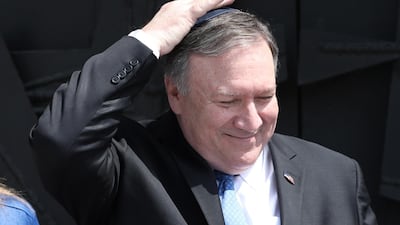Israeli Prime Minister Netanyahu toured with US Secretary of State Mike Pompeo around electorally important areas this week in an attempt to bolster his international standing in domestic voter’s eyes ahead of April elections.
Mr Pompeo's visit to Jerusalem was widely seen in Israel as a boost for Mr Netanyahu, who enjoys a close relationship with US President Donald Trump, just three weeks before a closely contested Israeli election.
In a further signal of solidarity with Israel, Mr Pompeo was later scheduled to visit the Western Wall with Mr Netanyahu in Jerusalem, which the United States now recognises as Israel's capital – to the dismay of the Palestinians and much pf the international community.
Mr Trump’s administration has marginalised the Palestinian cause and cut humanitarian funding to the UN body responsible for some 5 million Palestinian refugees.
Mr Pompeo, who has been on a regional tour that included Kuwait to promote the Trump administration's stance against Iran, received a warning from Israel, which worries it may again be in the sights of Hezbollah forces winding down their intervention in Syria's war.
During his stop in Israel, Mr Pompeo described Hezbollah as a risk to Middle East stability and conferred with Israel about the heavily armed, Iranian-backed Lebanese group ahead of a trip to Beirut.
Meeting Israeli President Reuven Rivlin in Jerusalem, Mr Pompeo listed Hezbollah, Palestinian Hamas and Yemen's Houthis – all recipients of Iranian support – as "entities that present risks to Middle East stability and to Israel".
"They are determined to wipe this country off the face of the planet and we have a moral obligation and a political one to prevent that from happening. You should know that the United States is prepared to do that," Mr Pompeo said in public remarks at the meeting.
For its part, Israel has carried out repeated air strikes on Hezbollah in Syria, where the Shi'ite Muslim militia – along with Russian air power – helped President Bashar Al Assad turn the tables against mainly Sunni Muslim rebels and militants.
Focusing his remarks on Lebanon, Mr Rivlin told Mr Pompeo that Lebanon's prime minister Saad Al Hariri "cannot say to anyone that Lebanon is separate from Hezbollah," a reference to the group's political clout in Beirut where it has ministers in the government as well as lawmakers in parliament.
"If some[thing] will happen from Lebanon toward Israel, we will hold Lebanon as the responsible [party]," Mr Rivlin said, speaking in English.
Washington echoes Israel's concern with Hezbollah, whose forces fought Israel to a standstill in the 2006 Lebanon war.
Mr Pompeo visited the US embassy in Jerusalem on Thursday.
